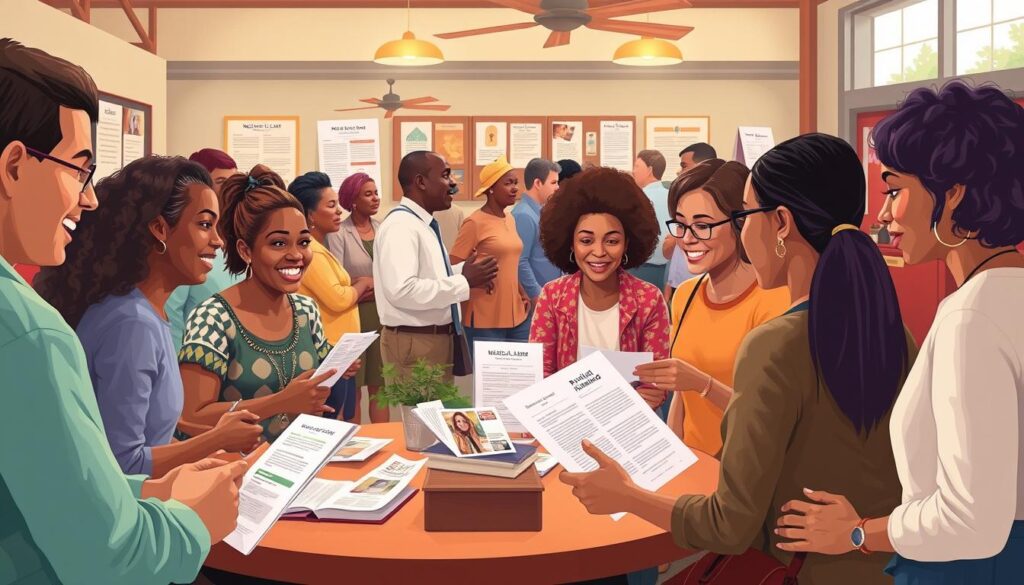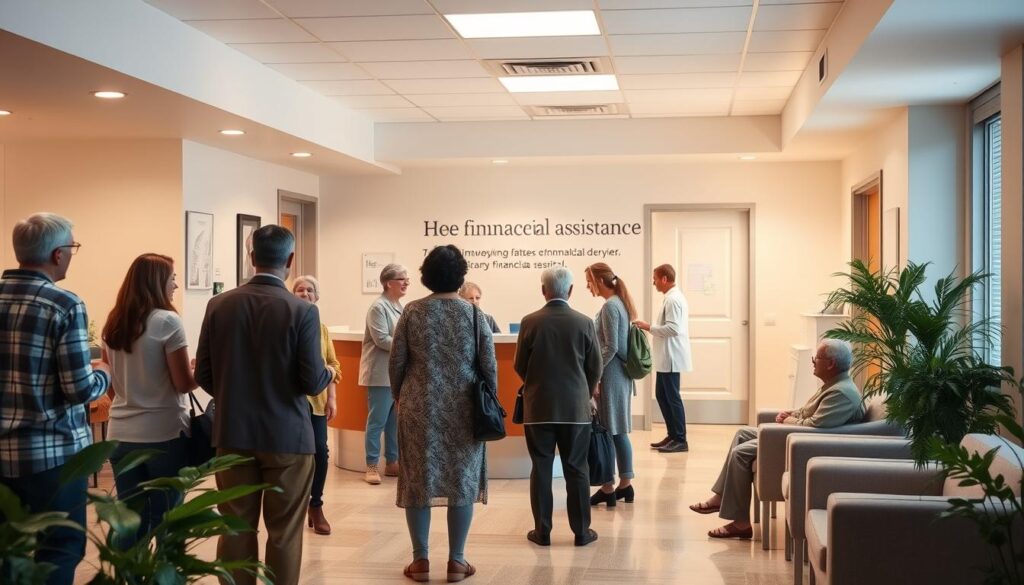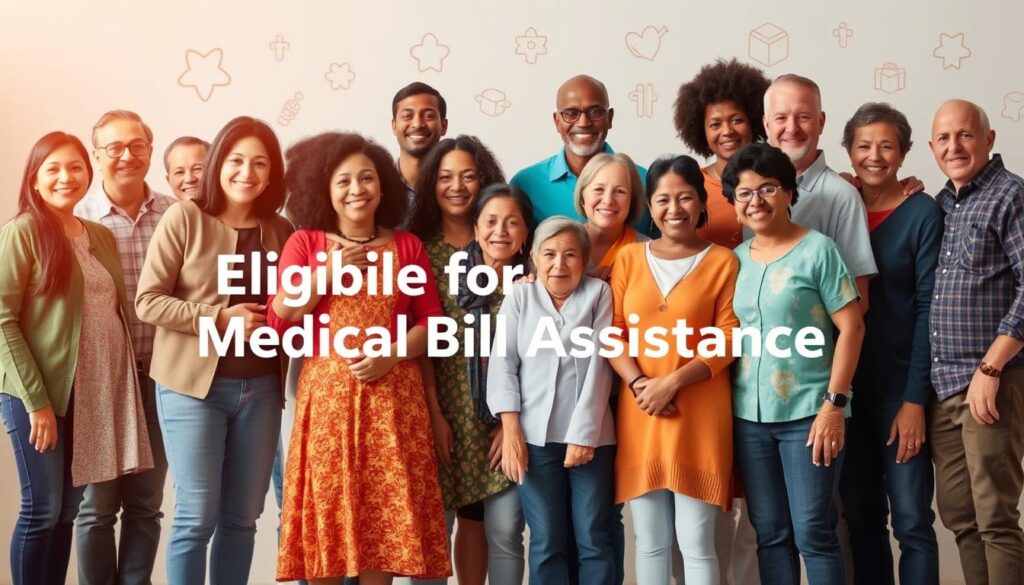Healthcare costs are soaring, and medical debt is growing. Local nonprofits have become a crucial safety net for struggling families. These organizations offer various services to ease the burden of unexpected medical expenses.
Their support includes financial aid, bill negotiation, and patient advocacy. They also provide counseling to help people cope with medical debt stress. These community-driven groups are committed to offering compassionate help.
From grassroots groups to faith-based programs, these nonprofits are making a difference. They navigate the complex world of medical debt for those in need. Their goal is to ensure no one faces healthcare financial challenges alone.
Key Takeaways
- Local nonprofits offer essential support for individuals and families facing medical debt
- Services range from financial assistance and bill negotiation to patient advocacy and counseling
- These organizations help navigate the complex landscape of medical debt and connect people with necessary resources
- Grassroots initiatives and faith-based programs are among the community-driven efforts providing relief
- Local nonprofits play a crucial role in ensuring no one is left to face the burden of healthcare-related financial challenges alone
Understanding the Burden of Medical Debt
The healthcare financial burden is growing, straining many families across the nation. The rising cost of healthcare is a primary driver. Medical treatments, drugs, and insurance plans have become costly challenges for many.
Unpaid medical bills can lead to damaged credit scores and collection agency harassment. Legal action may even be threatened. This burden forces tough choices between medical care and other basic needs.
The Rising Cost of Healthcare
- Increase in the prices of medical treatments and prescription drugs
- High deductibles and copays associated with insurance plans
- Lack of affordable healthcare options for many Americans
Consequences of Unpaid Medical Bills
- Damaged credit scores
- Collection agency harassment
- Threat of legal action
- Emotional distress and difficult financial choices
The healthcare financial burden has become a pressing issue affecting many. Unpaid medical bills can deeply impact individuals and families. Understanding the factors behind the rising cost of healthcare is key to solving this problem.
Local Nonprofits For Medical Bill Support
Medical debt can be overwhelming for many families. Local nonprofits offer support to ease this burden. These organizations provide local nonprofit medical bill support through various services.
These nonprofits offer community-based medical bill relief and charitable medical expense support. Their programs are tailored to meet the unique needs of their communities.
Comprehensive Assistance
Local nonprofits offering medical bill support provide a wide range of services. These include:
- Navigating the complex healthcare system and insurance claims process
- Negotiating with healthcare providers and medical billing companies
- Connecting individuals with available financial assistance programs
- Providing educational resources and guidance on managing medical debt
- Offering emotional support and counseling to those experiencing financial hardship
Collaborative Efforts
These nonprofits often team up with local healthcare organizations. This partnership allows for better coordination of local nonprofit medical bill support. By working together, they can provide more effective help to those in need.
| Organization | Services Offered | Eligibility Criteria |
|---|---|---|
| ABC Medical Assistance Foundation |
|
|
| Community Health Outreach Program |
|
|
These local nonprofits offer valuable support for those struggling with medical debt. They provide community-based medical bill relief and charitable medical expense support. Their help can be crucial in regaining financial stability.

Community-Based Organizations Providing Relief
Community-based organizations offer grassroots medical bill relief and faith-based assistance programs. These local nonprofits support individuals and families struggling with healthcare costs. They provide a crucial safety net for those who can’t afford essential medical care.
Grassroots Initiatives
Concerned community members often start grassroots medical bill relief initiatives. These grassroots medical bill relief initiatives operate on a small scale. They use local networks to provide financial assistance and negotiate with healthcare providers.
These initiatives also connect individuals with additional support services. They aim to help neighbors burdened by medical debt.
Faith-Based Programs
Faith-based medical debt assistance programs are another vital source of community-based medical cost aid. These programs are rooted in compassion and service. They use resources and volunteer networks from local faith communities.
Faith-based organizations offer various forms of help. These include fundraising campaigns and debt forgiveness initiatives. They provide a lifeline to those struggling with medical debt.
| Organization | Type of Assistance | Eligibility Criteria |
|---|---|---|
| Community Health Charities | Grassroots medical bill relief initiatives, including direct financial assistance and negotiation with healthcare providers | Low-income individuals and families, with a focus on those below 200% of the federal poverty line |
| St. Vincent de Paul Society | Faith-based medical debt assistance programs, offering debt forgiveness and connection to other support services | Individuals and families who are active members of the local parish or community |
Hospital Financial Assistance Programs
Medical debt can be overwhelming. Luckily, hospitals offer financial aid programs to ease the burden. These work alongside hospital bill assistance charities and patient medical debt counseling services to manage medical costs.
Hospitals have financial aid policies for reduced-cost or free care. These are based on income and household size. They ensure that people with limited funds can still get needed healthcare.
To get hospital financial aid, patients must apply and show proof of income. Eligibility varies, but those below certain poverty levels may qualify for coverage.
| Hospital Financial Assistance Program | Eligibility Criteria | Potential Benefits |
|---|---|---|
| XYZ Hospital Charity Care | Household income up to 200% of the federal poverty level | Full or partial coverage of medical bills, depending on financial need |
| ABC Medical Center Financial Assistance | Household income up to 300% of the federal poverty level | Discounted rates, payment plans, and referrals to community resources |
| Mercy Health Financial Assistance Program | Household income up to 400% of the federal poverty level | Debt forgiveness, debt settlement, and assistance with insurance enrollment |
Hospital financial aid programs can help those struggling with medical debt. Combined with local nonprofits and community groups, they offer comprehensive solutions. These programs make healthcare more affordable for many people.

Navigating the Medical Debt Landscape
Medical debt can be overwhelming, but help is available. Patient advocacy groups and support services offer valuable assistance. They can help you understand your rights, negotiate with providers, and find financial aid programs.
Patient Advocacy Resources
Patient advocacy organizations provide various services to help manage medical debt. They offer guidance on bills and insurance coverage. These groups also assist in communicating with healthcare providers and negotiating payment plans.
Additionally, they provide information on financial assistance programs and eligibility requirements. Referrals to legal services and debt counseling professionals are also available. Some even offer advocacy in disputes with providers or insurance companies.
- Guidance on understanding medical bills and insurance coverage
- Assistance in communicating with healthcare providers and negotiating payment plans
- Information on financial assistance programs and eligibility requirements
- Referrals to legal services and debt counseling professionals
- Advocacy and representation in disputes with healthcare providers or insurance companies
Using these resources can help you understand your options better. You can take proactive steps to manage your medical debt effectively. Patient advocacy empowers you to handle your financial situation with confidence.
| Organization | Services Provided | Contact Information |
|---|---|---|
| National Patient Advocate Foundation | – Assistance with medical bills and insurance claims – Access to financial assistance programs – Advocacy and representation in disputes | Phone: 1-800-532-5274 Website: www.npaf.org |
| Community Health Advocates | – Guidance on understanding medical bills – Help negotiating payment plans with healthcare providers – Referrals to legal services and debt counseling | Phone: 1-888-614-5400 Website: www.communityhealthadvocates.org |
| Patient Advocate Foundation | – Assistance with insurance appeals and denials – Access to co-pay relief and financial assistance programs – Mediation between patients and healthcare providers | Phone: 1-800-532-5274 Website: www.patientadvocate.org |
These advocacy resources can guide you through the complex medical debt landscape. They provide support to ease the burden of unpaid medical bills. With their help, you can face your financial challenges with confidence.
Eligibility Criteria for Assistance
Local nonprofits and assistance programs offer medical bill support. They have specific eligibility criteria. Understanding these guidelines is essential for those seeking financial relief.
Income Guidelines
Medical bill assistance programs often have income thresholds. These income guidelines for medical debt relief consider household size and federal poverty level. They ensure low-income individuals and families get needed support.
Documenting Financial Need
Applicants may need to provide documentation to demonstrate their financial need for aid. This can include pay stubs, tax returns, and bank statements. The process helps direct limited resources to those most in need.
The eligibility for medical bill assistance process requires thorough financial documentation. It ensures fair distribution of available resources.
- Collect and organize all relevant financial documents
- Be prepared to provide proof of income, assets, and expenses
- Seek guidance from patient advocates or nonprofit organizations to navigate the application process
Understanding eligibility criteria for assistance is crucial. Proper documentation of financial need is key. These steps can boost chances of receiving critical medical bill support.

Preventing Future Medical Debt
Managing healthcare expenses can be challenging. However, there are ways to prevent medical debt. A key approach is negotiating medical bills, which can significantly reduce healthcare costs.
Negotiating Medical Bills
Medical providers often negotiate bills. This can lower the amount owed or create a manageable payment plan. Here are effective strategies for negotiating medical bills:
- Review the bill carefully: Ensure all charges are accurate. Identify any errors or questionable items. Be ready to discuss them with the provider.
- Ask for an itemized bill: This breakdown helps understand costs. It can reveal areas where negotiation is possible.
- Seek financial assistance: Many providers offer programs for those who qualify. These are based on income and financial situation.
- Negotiate a reduced payment: Explain your financial situation politely. Request a lower payment amount or a more manageable plan.
- Seek help from patient advocates: Some hospitals provide advocates. They can assist with negotiating medical bills and navigating the healthcare system.
Proactive steps can prevent medical debt. Negotiating medical bills is a powerful tool. It helps maintain financial stability during unexpected medical expenses.
The Role of Medical Bill Counselors
Medical bills and healthcare costs can be overwhelming. Medical bill counselors offer support and guidance. They advocate for patients, negotiate with providers, and connect them to healthcare financial assistance programs.
These experts understand medical billing and insurance claims. They review bills, spot errors, and negotiate better payment terms. Medical bill counselors can help patients save thousands on medical expenses.
Medical bill counselors also act as patient advocates. They guide people through the healthcare system. They connect patients with local nonprofits offering financial help.
Working with a counselor helps patients understand their financial obligations. They explore options to reduce medical debt. Patients can develop plans to manage healthcare costs.
This support can ease stress related to medical bills. It allows people to focus on their health. A medical bill counselor can be a game-changer for those with medical debt.

“Medical bill counselors play a crucial role in advocating for patients and connecting them with the resources they need to manage their healthcare costs.”
Success Stories and Testimonials
Local nonprofits have made a significant impact on managing medical debt. They provide relief and restore financial stability for those burdened by high healthcare costs. These organizations offer crucial support to individuals struggling with medical bills.
Sarah, a mother of two, faced overwhelming medical bills for her child’s chronic illness. “I didn’t know where to turn,” she recalls. “Then we found a local nonprofit specializing in medical bill support.”
The nonprofit helped Sarah navigate the system and negotiate with providers. They cleared her outstanding balance, resulting in a life-changing experience for her family.
John, a retired veteran, struggled with costs for his service-related injury treatment. “The bills kept piling up,” he says. “The nonprofit medical bill assistance program stepped in and took the burden off.”
They handled all paperwork and negotiations for John. This allowed him to focus on his recovery without financial stress.
“The support we received from the nonprofit organization was truly a godsend. They not only helped us resolve our medical debt but also provided invaluable guidance and emotional support during a very difficult time.”
These success stories of medical debt relief show the power of community-based initiatives. The testimonials of nonprofit medical bill support highlight their transformative impact on struggling families.
| Name | Medical Condition | Assistance Received | Outcome |
|---|---|---|---|
| Sarah | Chronic Illness in Child | Navigation, Negotiation, Debt Clearance | Restored Financial Stability |
| John | Service-Related Injury | Paperwork Management, Negotiation | Reduced Burden of Medical Bills |
Building a Supportive Network
A strong support network is crucial for managing medical debt challenges. Local nonprofits and community organizations offer valuable resources and guidance. These connections can significantly ease your financial burden.
Connecting with Local Organizations
Research medical bill assistance groups in your area. These can include grassroots initiatives and faith-based programs. They’re dedicated to helping those struggling with medical debt.
Contact these organizations to learn about their services. Many offer financial counseling, bill negotiation, and connections to other resources. Ask about their eligibility criteria and required documentation.
- Identify local nonprofits and community organizations that focus on medical bill assistance
- Inquire about the specific services and support they provide to individuals with medical debt
- Explore the eligibility criteria and documentation requirements for accessing their assistance
- Connect with these organizations to learn about their programs and how they can help you or someone you know
A strong local network provides access to diverse support and resources. These organizations can guide you, negotiate with healthcare providers, and link you to additional programs.
Don’t face medical debt challenges alone. Your local support network can guide you through this complex situation. With their help, you can regain control of your finances.
Conclusion
Local nonprofits offer vital support to those struggling with medical debt. They provide a lifeline for people facing complex medical billing challenges. These organizations help relieve the financial strain of healthcare costs.
Grassroots groups, faith-based organizations, and hospital programs offer various helpful initiatives. These include patient advocacy, eligibility guidance, and negotiation strategies. They empower those in need and help restore financial stability.
Success stories highlight the profound impact of local nonprofits. They create supportive networks and connect people with essential resources. These organizations tackle the medical debt crisis head-on.
By doing so, they ensure that no one faces healthcare’s financial burden alone. Their work is crucial in addressing this growing problem. Local nonprofits continue to make a significant difference in people’s lives.

